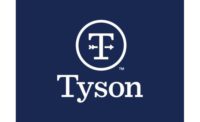Tyson Foods Inc., one of the world’s largest food companies and a recognized leader in protein with leading brands including Tyson, Jimmy Dean, Hillshire Farm, Ball Park, Wright, Aidells, ibp and State Fair, today reported the following results: Sales were reported at $10.193 billion, a slight drop from 2018’s $10.229 billion Q1 results. Operating income declined from $922 million in 2018 to $807 million in 2019. Net income declined from $1.632 billion to $552 million.
“Our diversified business model continues to set Tyson Foods apart,” said Noel White, Tyson’s president and chief executive officer. “The Prepared Foods and Beef segments delivered strong results in our fiscal first quarter, while the Pork and Chicken segments performed well given market conditions. We’re proud of the growth Prepared Foods has achieved in the past five years and the role it has played in stabilizing volatility while growing earnings. Moving forward, we will remain focused on growing Prepared Foods as well as our value-added and international businesses.
“In the first quarter, we completed the acquisition of Keystone Foods. I’m pleased with the progress of the integration and remain confident Keystone will play an important role as we execute our growth strategy, particularly with strategic customers and in key international markets.
“Fiscal 2019 holds many opportunities for Tyson Foods. Global protein demand remains strong, and we are well positioned to meet the demand with our diversified business model and differentiated portfolio. Our cash flow and strong balance sheet support our capital commitments and our growth strategy. Our team is focused on the success of our stakeholders, and I am confident in our ability to deliver on our fiscal 2019 outlook of $5.75-6.10 adjusted earnings per share while enabling long-term, sustainable growth.”
Summary of Segment Results
- Beef - Sales volume decreased due to a reduction in live cattle processed. Average sales price increased as exports and demand for beef products remained strong. Operating income increased as Tyson continued to maximize its revenues relative to live fed cattle costs, partially offset by increased operating and labor costs.
- Pork - Sales volume decreased as a result of balancing our supply with customer demand during a period of margin compression. The average sales price decrease was associated with lower livestock costs. Operating income was strong, but lower than prior year results due to periods of compressed pork margins caused by excess domestic availability of pork and higher operating and labor costs.
- Chicken - Sales volume increased primarily due to incremental volume from business acquisitions. Average sales price decreased due to sales mix primarily associated with the acquisition of a poultry rendering and blending business in the fourth quarter of fiscal 2018. Operating income decreased due to increased operating and labor costs, in addition to higher feed ingredient costs and current market conditions.
- Prepared Foods - Sales volume decreased primarily from business divestitures. Excluding the impact of the business divestitures, sales volumes increased slightly. Average sales price increased due to product mix which was positively impacted by business divestitures. Operating income increased due to strong demand for our products and improved product mix, partially offset by increased operating and labor costs.
For fiscal 2019, USDA indicates domestic protein production (beef, pork, chicken and turkey) should increase approximately 3% from fiscal 2018 levels, but Tyson said it expects domestic availability of protein to increase approximately 2% as export markets should absorb a portion of the increase in production.
Source: Tyson Foods Inc.




